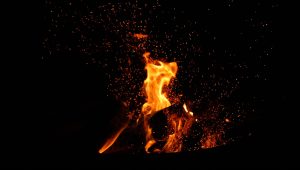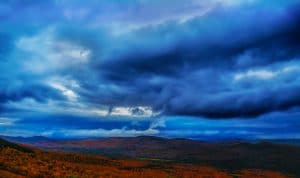In Part I, we discussed that science helps us understand who we are, especially with questions such as how, why, and what. But science does not answer the questions of “How do we make meaning in our lives?” or “To whom are we connected?” or “Why do we matter?” These are the domain of theology, religion, and faith.
Both science and theology are looking into the face of mystery with our questions, including when we ponder, “Who are we?” And in many ways, the work of science is much easier than the work of theology, for scientists have material ways in which they can conduct experiments. They have mathematical formulas to guide them along the way. They have hypotheses and theories that can be tested again and again in a tangible, factual manner.
Theology, on the other hand, takes us to the edge of mystery and leaves us with our questions. Theology asks us to ponder over, to wonder about the mysterious source of all creation and what that mysterious source has to do with us mere mortals. It asks us to sit and to live with our questions, and to understand that most often, we don’t know the true answers.
Who are we? Where are we going? What is truth? Why have you forsaken me? Where were we when the foundation of the earth was laid? (Job 38) How do we reach out to others with mercy and compassion? Who is my neighbor?
Who are you, God, and what is your name? And even when the book of Exodus offers us a glimpse of Moses and the burning bush, when Moses dares to ask God’s name, what is the reply? “I am who I am, I am who I am becoming.” The answer is one of mystery. God is who God will be. God’s thoughts are not our thoughts, and God’s ways are not our ways.
Even when the book of Exodus offers us a glimpse of Moses and the burning bush, when Moses dares to ask God’s name, what is the reply? “I am who I am, I am who I am becoming.” The answer is one of mystery.
And so we march forward in life, clinging to the glimpses of grace we are given along the way. That is why it is can be important to be part of a faith community where we can share our own glimpses of grace with one another. Together, we can remember words from Psalm 23: “The Lord is my shepherd, I shall not want . . . even though I walk through the valley of the shadow of death, I will fear no evil because you are with me.” We know that “as a deer longs for flowing streams, so my soul longs for you, O God. My soul thirsts for God, for the living God.” (Psalm 42)
We know that our ancestors before us asked the same questions and lived their lives of promise and pain, of joy and sorrow, of beauty and betrayal under the watch of the great “I Am.” When we read their stories closely, we see people who were flawed and frail. Even those who were proclaimed to be God’s chosen ones lived ordinary lives characterized by carelessness and compassion, thoughtlessness and trust. They lived like us, with faith and hope and promises. Most of all, they clung to the promise that God is with us in life, in death, and in life beyond death. Thanks be to God.
It is this promise above all others that carries me and carries us through each day. Whether we stand together at the communion table or at the edge of a grave, we stand under this promise. In those moments, we can answer the question of who we are with clarity and assurance. We can proclaim that “We are the body of Christ.” We can remember that “We are the people of God.” We are witnesses to all those who have gone before, and we hold the promises for all those who will follow.
Science can tell us that our bodies are made up of some 10 trillion cells. We can be grateful that scientists have come to understand how vaccinations can be used to stop horrible diseases like polio or diphtheria or COVID-19, and that they have developed medicine that can cure malaria and stop pneumonia in its tracks. We can be grateful that lasers can often repair the tissue in our eyes and surgeons can replace our knees and hips to help make us mobile once again. Today, we can offer gratitude for the technology that makes our lives more comfortable and manageable. Without all the scientific research many more lives would be cut short.
But science also brings us devastation. For when the atom was split, we learned that its energy could be used for bringing electricity to the nations or destruction to a people. Science brings us breathtaking discoveries, and science offers us poisonous chemicals and brilliant bombs. Science unravels the mystery of DNA, and science can use that knowledge to prevent illness or clone creatures. But will science–can science or scientists–make appropriate choices about how discoveries are to be used?
Will science–can science or scientists–make appropriate choices about how discoveries are to be used?
Do we not need theology to help determine how to make meaning out of what we know? Do we not need to remember every day that we are finite and we are flawed? Do we not need brakes and boundaries that call us to look out for the good of all, not just the pleasure of a few? And even if science unravels all the parts and the pieces of every corner of the universe, can science explain away the source of that creation? Do we not understand that we are more than the sum of our parts? We are more than a particular number of cells. Are we not more than simply the totality of our genetic make-up?
Can science ever really tell us why we are who we are, since we are each individually affected by our experiences, our thoughts, and our interactions with the world around us? We are affected by beauty and destruction. We are formed by our relationships with other people. Our worldview is expanded by education and exploration. Our minds learn to ask new questions and even sometimes accept new answers. Does anyone really still believe that the Earth is the center of the universe? It wasn’t that long ago that Galileo was condemned for looking through a telescope and discovering that the Earth revolved around the sun and not the other way around.
Science continues to bring us answers to questions that we probably didn’t know we had, and scientists will continue to ponder the question of “who we are.” As people of faith, we too are required to ask that question again and again, knowing that the answers may look a little different than they did two or three thousand years ago. After all, we can be sure that we don’t live in a three-tiered universe with a layer of heaven just overhead and the fires of hell just below.
But we live in a world where we have to make choices all the time of who we are and what we believe. We have to continue to try to make meaning on a small planet that gets more crowded every day. We need to ask questions that might help us to live together in peace with people whose beliefs are different than our own. We need to ask questions that help us to better share our limited resources. We need to use our faith in ways that might unite us with others so that our divisions don’t cause us to destroy life as we know it. For we are all finite and fragile. We can all be hurt in so many ways . . . but we can also be transformed by beauty and truth.
We give thanks for science and the small and grand discoveries that make our lives better every day. We give thanks that we are free to pursue new knowledge and perhaps even some wisdom along the way. We give thanks for the past and all those whose lives have made it possible for us to live here today. We give thanks for the present, for this moment to share in the miracle that is life and the possibility of life made new. And we give thanks for the future, for new knowledge, and for generations to come who will ask old questions made new in their asking, and who will continue to wonder like the Psalmist: When I look at your heavens, the work of your fingers, the moon and the stars that you have established, what are human beings that you are mindful of them, mortals that you care for them? And as we ask our questions, we wait with Psalmist (Psalm 130) once more, and pray:
Out of the depths, we cry to you, O God. God hear our voice! Let your ears be attentive to the voice of our supplications! If you, O God, should mark iniquities, who could stand? But there is forgiveness with you, so that you may be revered. We wait for God, our souls wait, and in God’s word we hope; our souls wait for God, more than those who watch for the morning, more than those who watch for the morning. Everyone have hope in God! For with God there is steadfast love and with God there is great power to redeem. Let us hope in God from this time on and forevermore. Amen.
Reality Changing Observations:
1. What is your faith perspective on the question of who we are?
2. How does science magnify your views of an illimitable God, if at all?
3. In what ways does scripture support scientific methods of inquiry?





